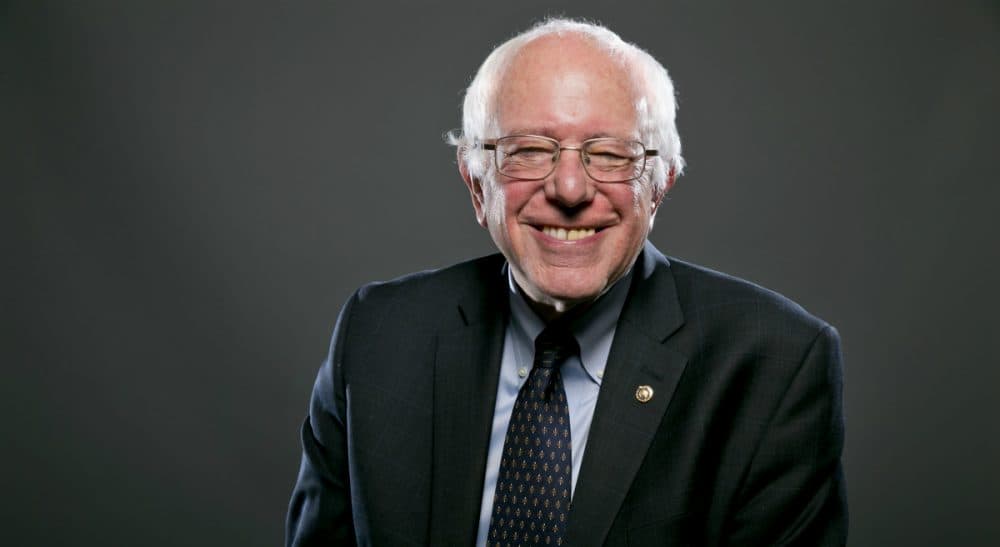Advertisement
Will Bernie Sanders Win By Losing?

Bernie Sanders is a true believer, basking under his self-assigned socialist label and setting liberal hearts aflutter at the prospect that he’ll nudge likely Democratic nominee Hillary Clinton portside in the primaries. That’s the conventional take on the Vermont senator and presidential candidate, who seems to be the only progressive in America who thinks he actually might beat Clinton. (“’We’re going to do better than people think. And I think we’ve got a shot to win this thing.”)
If all you know about Sanders is this common wisdom, you’re selling him short. Here are two things you don’t know: He’s actually a pragmatic politician who has faced sails-trimming charges from his earliest days in office. And if history is any guide, even a failed Sanders candidacy may remake more than Clinton; he could leave his mark on the Democratic Party as well.
if history is any guide, even a failed Sanders candidacy may remake more than [Hillary] Clinton; he could leave his mark on the Democratic Party as well.
That Sanders, who bravely constructed a political career without joining either major party, is a hard-nosed realist may seem surprising. Yet it shows in his decision to enter the Democratic primaries, consciously steering clear of a quixotic third-party run. This practical streak has roots going back at least to his 1977 defection from Vermont’s left-wing Liberty Union Party. Under its banner, he’d lost four runs for statewide office, and he was fed up. A friend told Mother Jones magazine that a hankering to win, and actually legislate some progressive priorities, “distinguished [Sanders] from leftists who were move invested in the symbolism than in the outcome.”
When he finally won a race for mayor of Burlington, Vt. in 1981, Sanders disgruntled some progressives by a willingness to work with the business community. Notably, he broke with environmentalists by supporting construction of a wood chip plant, which “initiated a split that did not heal,” journalist Greg Guma wrote in "The People’s Republic," his enlightening account of Sanders’s mayoralty.
The candidate who today demands action against climate change viewed environmentalists then as “too utopian for present circumstances,” writes Guma, adding that Sanders’s city hall pushed ideas that its officials once would have cursed as “capitalist appeasement,” a mix of radical and conservative ideas.
Guma and everyone else agree that Sanders ran a competent and exciting administration, which helps explain the mayor’s stunning showing in his 1988 race for Vermont’s lone congressional seat. Placing a strong second, he beat the Democratic candidate, foreshadowing his capturing the seat two years later (he’s been in Congress ever since).
Back then, I worked for a newspaper covering Vermont and remember Sanders coming by for an editorial board meeting, during which, in another sign of his political realism, he expressed wariness about gun control. (Vermont is a blue state, but they do like to hunt up there.) He confessed that his answer wasn’t a good one, which I understood to mean it was un-progressive. But he has stuck to it, voting against several gun control measures in Congress.
The split between compromisers and idealists today usually plays out in the Republican establishment-versus-Tea Party drama, but Democrats have long had their version. (Sanders’ split with Liberty Union echoed John F. Kennedy, who, according to "The Best and the Brightest," harbored a “vague suspicion that liberals would rather lose gallantly than win pragmatically.”) Of course, the dig against Sanders’s compromises is numbskull. Our greatest leaders, from Lincoln to FDR, married conviction to compromise, for the simple reason that, in a world where people disagree, half-measures often are the stuff of progress.
Clinton has made some feints in progressives’ direction on immigration and criminal justice, as if to validate those liberals who predicted salutary results if Sanders got in. Yet obsessing about the horse race and his effects on her alone is myopic. History offers examples of presidential candidates who lost — even in the primaries, as Sanders is apt to — but did well enough to win the nation to their pet causes. Think 2000 and John McCain, whose stalled campaign finance reforms were unstoppable after his GOP campaign earned him a national fan club. Or 1968, when Eugene McCarthy galvanized opposition to the Vietnam War despite losing the Democratic nomination.
it’s hardly unthinkable that parts of his agenda will outlive his campaign.
No, I don’t believe Sanders will remake us into a Scandinavian-style socialist democracy. But it’s hardly unthinkable that parts of his agenda will outlive his campaign. His call for spending $1 trillion on rebuilding decaying roads, harbors, schools, and utilities may sound pie-in-the-sky, until you remember that Ronald Reagan’s economic guru agrees. Few deny that the safety of public infrastructure is a basic government obligation, so we may someday get a kumbaya moment around a big rehab. (We’d better.) And from inequality to climate change, most Americans agree with Sanders that the government should flex its problem-solving muscles more.
Some may say Sanders is merely the surfer riding Democrats’ resurgent-progressivism wave, exemplified by the Occupy crusade and Elizabeth Warren’s star power. But that chicken-and-egg argument over which came first, the man or the movement, always applies. William Jennings Bryan tapped decades-old prairie populism in his 1896 campaign, which, though losing, remade Democrats from laissez-faire types into the party of the little people. Barry Goldwater’s 1964 bid capped years of Republican hostility to the New Deal, and his reincarnation in the person of Reagan seemed more plausible after the federal failures, real and perceived, of the 1960s and '70s.
In 2008, Stephen Colbert mockingly paraphrased Rudy Giuliani’s dismissal of his GOP opponents’ primary victories: “Those fools! They think they can win — by winning!” Funny stuff, but Sanders may defy the jokes and join the ranks of those who proved you can win by losing. After all, he's a canny enough politician, in the best sense of that phrase.
